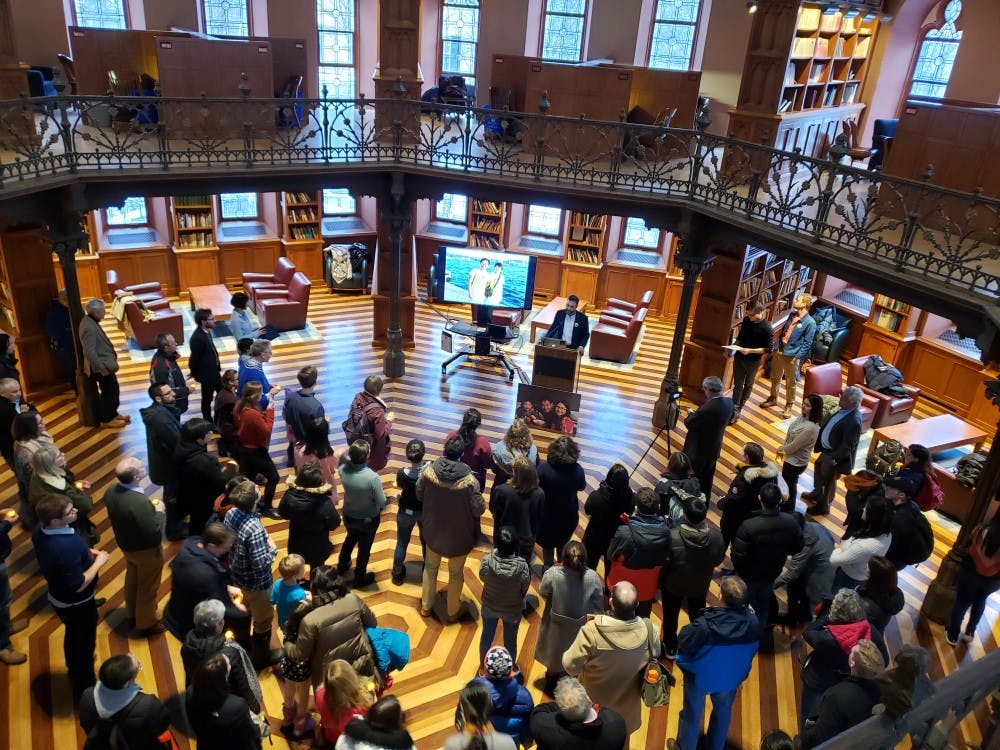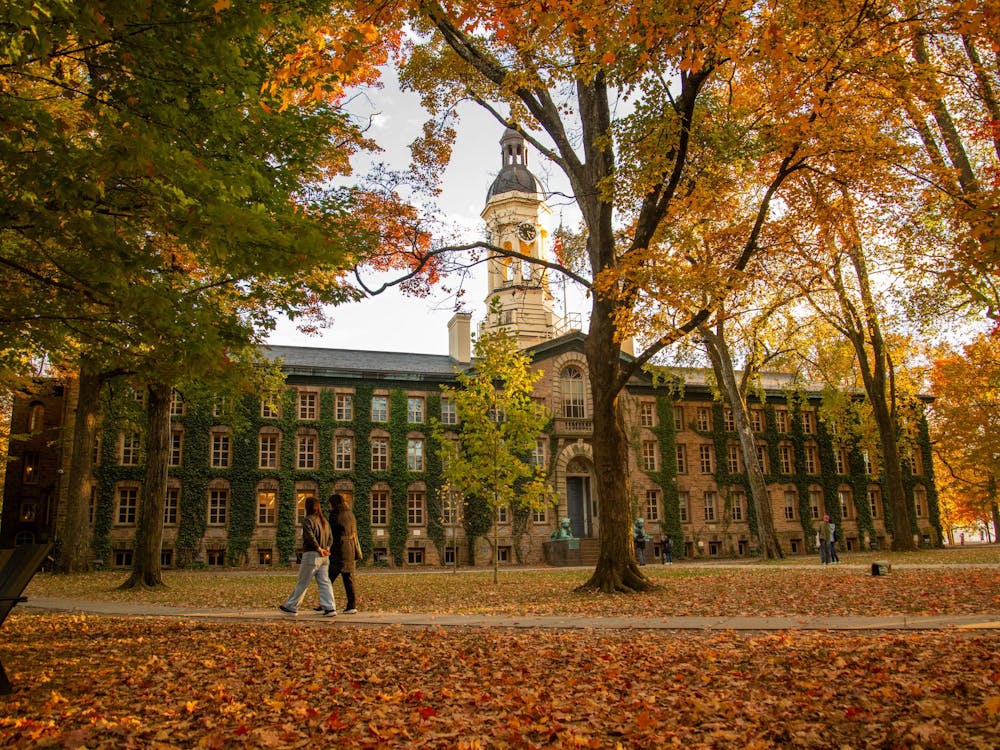On Wednesday, Feb. 20, a group of community organizers held a Day of Action to bring attention to the case of Xiyue Wang, a University history Ph.D. student detained in Iran.
The day began with a “call-a-thon” in the Campus Club Library, where volunteers reached out to elected representatives to speak about Wang’s detainment. The “call-a-thon” was followed by a rally and candlelight vigil in the Chancellor Green Library.
As of Feb. 20, Wang has been held in the Evin Prison outside of Tehran for 927 days. In May of last year, University faculty, staff, and students held a rally in solidarity with Wang.
Last year, the United Nations concluded that the 10-year sentence Wang received under charges of espionage is arbitrary and urged his immediate release.
The first speaker of the evening was Hua Qu, Wang’s wife. She opened by expressing her gratitude to Wang’s friends and professors, as well as the University and its efforts to secure his freedom.
Qu described how she would zoom in on Evin Prison on Google Earth to examine the landscape and clusters of greyish-blue buildings as if she could find him behind the walls.
“I looked for a courtyard where I could imagine Xiyue spending his precious daily hour of open air,” she said, adding, “but the closer I zoomed in, the more blurred the image becomes and clearer the futility our situation [appears].”
She described the “roller-coaster” of crisis management, a full-time job, and the challenges of parenting as a single working mom. Qu described the toll on her five-year-old son, Shaofan, who has not seen his father for over half of his childhood. Qu discussed some of Shaofan’s grim drawings, some of which included “jails bursting in flames” and “men wearing black clothes with chains in hand, their faces covered.”

According to Qu, Wang’s respect for Islam and love for Persian culture have remained. He continues to read books avidly, which Qu describes as “one of few comforts to escape the harsh conditions at Evin.”
“With books in his hand, he is able to block the noises and smells of over 20 cellmates cramped into that underground, cold cell, and stay focused, as if he were in his beloved Firestone Library, which he cherishes fondly,” she said.
Qu went on to criticize both the Obama and Trump administrations for their lack of action regarding Wang’s imprisonment.
“I have tried not to lose hope,” she said, “but it has become clear to me that the value that Iran places on him as [an] American is not matched by his own government’s commitment to bring him home.”

She explained that since neither administration has taken action to seriously engage in talks, “it is obvious that the life of one American does not attract the political will required for decisive action to be taken for his rightful freedom.”
She concluded her speech by re-emphasizing Xiyue’s appreciation for the Iranian people and their culture.
“I plead for the gate of mercy to be opened for my husband’s liberty and the reunion of our family,” she said.
In the Campus Club Library earlier that day, a log recorded the names of the volunteers and the representatives they called. Illustrations drawn by Wang’s five-year-old son, Shaofan, were on display beside a photograph of the Wang family.
Organizers provided volunteers with sample scripts which implored representatives to “prioritize bringing home Xiyue Wang.” Volunteers wore buttons with a photograph of Wang and his family. Postcards displaying a photograph of Wang were also available for volunteers to send to representatives, family, friends, and “anyone with influence.”
Katherine Trout ’19 wrote to representatives in her home state of Missouri.
“It’s incredibly important as Princeton students to support one another in scholarly pursuits, especially regarding international research,” Trout said. “I wanted to come out as a fellow student to support his release.”
Mikey McGovern, a Ph.D. student in the History of Science and president of the Graduate History Association, was one of the organizers of the event. McGovern is the president of Free Xiyue Wang, a graduate student group recognized by the University that coordinates efforts and events to secure Wang’s return.
“One of the things we are trying to do is keep things alive and do more than just hold a vigil every single year to remind people of the situation,” he said. “We want to actually turn consciousness into action.”
However, since a massive winter storm led to the closure of many government offices, including in D.C. and New Jersey, many of the volunteers working the phones were forced to leave messages for their senators and representatives.
Dean Lieberman, an independent foreign policy and communications consultant based in Washington, D.C. who works with Wang’s wife on raising awareness of Wang’s case and calling for his release, was also in attendance.
“Despite the snow storm, it was nice to see so many people come out to show support and make calls to congressional offices,” Lieberman said.
After the “call-a-thon,” McGovern welcomed a crowd of nearly a hundred students, faculty, and community members to the rally in the Chancellor Green Rotunda and thanked them for attending despite the storm.
“While there are some things like snow that we definitely can’t change, it’s important that we gather together like this and coordinate our efforts against all odds,” McGovern said.
Although he did not meet Wang personally, McGovern said that as graduate students transition from coursework to exams and to the field, it is more important than ever “to keep the spirit alive on this campus and in the hearts and minds of Americans.”
Joshua Bauchner, a history graduate student in Wang’s cohort, also spoke about him as a student, scholar, and intellectual.
Despite not sharing many research interests and being “novices in each others’ areas,” Bauchner described how their phone conversations are now dominated by questions about each others’ research.
“What I remember most strongly was Wang’s commitment to further querying each suggestion and idea. In a kind and generous manner, he persisted in following each thread further and further, with no topic too large or too small,” Bauchner said. “He asked because he truly wanted to learn something new ... and he truly wanted me to learn something as well.”
Bauchner said Wang completely embodies the drive of the liberal arts, saying his purpose in research was “not to know something for the sake of nothing, nor to know it as the balm for the soul or as a guide to action, but to know it as a meaningful act of understanding itself, to place it in the perpetual revision of our shared vocational literature.”
Keith A. Wailoo, Henry Putnam University Professor of History and Public Affairs and Chair of the History Department spoke on the injustice of Wang’s imprisonment and the denial of his “basic freedom to be with his loving family every hour of every day.”
Having spoken to Wang occasionally throughout the past two-and-a-half years, Wailoo discussed how their conversations deepen his “sadness and anger about [Wang’s] plight and [his] admiration for this earnest, direct, incredibly talented, brilliant man who is both devoted to his studies and family.”
“Every occasional talk that we have reinforces my appreciation for what a kind, thoughtful, and devoted father and husband he is,” Wailoo said. “The History Department, faculty, staff, and students stand ready, hopeful for the day that we can welcome him back to Princeton and Dickinson Hall [...] and we are once again able to nurture the embers of his academic dream so that it can be fully rekindled as a flame.”
Taylor Zajicek, another history Ph.D. student and organizer of the event, spoke about the Free Xiyue Wang group and informed attendees of ways in which they can continue to support Wang and his family.
Daniel Munier, a senior program officer for Scholars at Risk, an international network of institutions that advocates for the human rights of scholars around the world, also spoke at the event. He discussed the importance of protecting scholars and their academic freedom.
“Even here in the United States, rhetoric and policy that undermine science and facts risk shrinking the American university space,” he said.
The last speaker of the night was Sarah-Jane Leslie, Dean of the Graduate School.
“Every flicker of every candle in this room represents another moment in which Wang is deprived of his rightful place among his family, his colleagues, and his friends here at Princeton,” she said.
At the end of the rally, the lights were dimmed as attendees shared a moment of silence for Wang.
The call-a-thon was held from 10 a.m. to 5 p.m. and the rally and candlelight vigil were held at 5 p.m.








